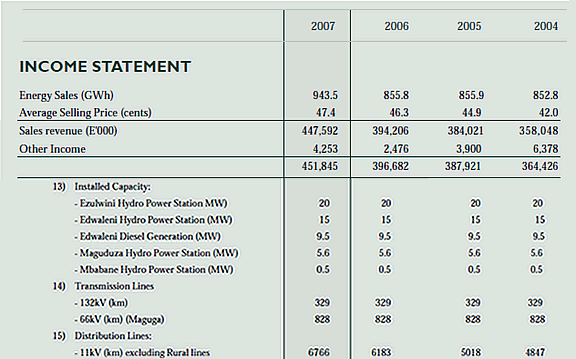 Swaziland Electricity Company(SEC)
Swaziland Electricity Company(SEC)
All data are collected in the Fiscal Year of 2008-2009.
Company Profile and History
SEC was established in 2007 by the Swaziland Electricity Company Act of 2007. The legal regime changed the Swaziland Electricity Board (SEB) into the Swaziland Electricity Company with a specific mandate to generate, transmit, distribute and supply electricity in the country.
The regulatory functions which were previously given to SEB have now been transferred to an independent separate entity-the Energy Regulatory Authority. Unlike the SEB, the Swaziland Electricity Company (SEC) will be run along full commercial lines, in an environment of competition. SEC will be subject to licensing requirements and regulation of the Energy Regulatory Authority on equal terms with any other Electricity Supply participants.
In order to assist in the electrification of rural areas, Government through a grant from the Republic of China has, so far, made available to SEC about E45 million. The objective of Government is to ensure that SEC constructs distribution lines that will reduce the cost of connection of people in the rural areas. These distribution lines are constructed towards schools, clinics and other strategic Government installations.
In Country Location
Mhlambanyatsi road, Eluvatsini house, Mbabane;
Telephone: +268 409 4000
Telefax: +268 404 2335
Services and Products
The objectives of SEC are to generate, transmit, distribute and supply electricity also to import and export it into and out of Swaziland.
Number of Employees
776 people
Financial Information

Market Share
SEC currently owns the monopoly on the import, distribution and supply of electricity via the national power grid.
Business Objective
“To be a major player in energy sector developments nationally and regionally and to provide reliable and safe power supply of acceptable quality to meet the needs of our customers sufficiently, profitably and in an environmentally sound manner”
Business Model
The National Development Strategy (NDS) Unit is the main overall planning department. The unit manages the operationalisation of the National Development Strategy. The NDS consolidates all programmes aimed at achieving the National Vision. The work of the Unit brings together policy, strategic planning, the capital programme and the budget. The Ministry of Natural Resources and Energy is responsible for overall policy planning. The Ministry’s planning procedures are the National Energy Policy 2002. The Ministry of Natural Resources and Energy supports the position that investment in energy and industrial development in a sustainable manner, can eradicate poverty in the country and that rural electrification will continue to be a priority for the State.
Against this background, SEC has formulated its corporate strategy. The Performance Contract has been used to focus on specific action plans that were identified as key for the transformation of the organisation. Other focus areas are: system strengthening; power supply reliability improvement; customer education on the service provided by the organization; customer service; operating cost optimization; to investigate opportunities of developing a coal-fired thermal power station.
Ownership of Business
The Ministry of Natural Resources and Energy is the national energy authority. The legal energy policy and planning framework in Swaziland is controlled solely by the government via the Ministry of Natural Resources and Energy.
The energy regulator was established by the Energy Regulatory Authority Act of 2007. The Act establishes an independent Energy Regulatory Authority as a body corporate with the power to sue and be sued in its own name. The regulatory body is qualified as independent.
Benefits Offered and Relations with Government
On the 1st of March 2007, the Electricity Act of 1963 was repealed, as a result of the promulgation of the Electricity Act of 2007 and the Swaziland Electricity Company Act of 2007. The Electricity Act of 2007 provides for the regulation of the Electricity Supply Industry in Swaziland. It generally regulates the generation, transmission, distribution and supply of electricity in Swaziland. Any person generating, transmitting, distributing or supplying electricity in the country is required to be licensed by the Energy Regulatory Authority. Power activities for which a license include: generation, transmission, distribution, import, export, and supply of electricity; perform the functions of integrated power system operator; and off-grid and mini-grid supplies of electricity. Independent Power Producers were expected to increase after the enactment of the Electricity Act of 2007; however, this has not been the case.
Product Development
The Distribution Department embarked on an extensive maintenance programme to ensure a continuous supply of power. The maintenance activities involved bush clearing along line routes, replacement of rotten poles and disc replacement. A number of new outgoing 11kV feeders were constructed to improve the reliability of the Distribution Network. Three additional feeders were included into the network supplied from Lobamba substation and another three from Mankayane substation. The aim of this exercise was to separate the long rural lines from lines that supply urban and peri-urban areas. Some of the rural lines were equipped with sectionalizing equipment to further enhance discrimination against faulty lines, thus ensuring service continuity to the rest of the customers.
Line capacity upgrades were implemented in a number of areas throughout the country including Mbuluzi, Mhlume, Khuphuka, Mpolonjeni, Kashoba, Ngogola, Dwaleni, Sigangeni, Nhlangano and a number of other areas. The upgrades are as a result of the increased electricity usage due to the implementation of the rural electrification project and other Government funded Rural Electrification projects.
The Manzini Central Business District (CBD) underground cable project is in progress and upon completion the capacity and reliability of supply will improve. An underground cabling exercise was completed in Mbabane, thus achieving improved service delivery in terms of a suitably rated and more reliable system and improving the visual impact by removing overhead conductors in the city centre.




